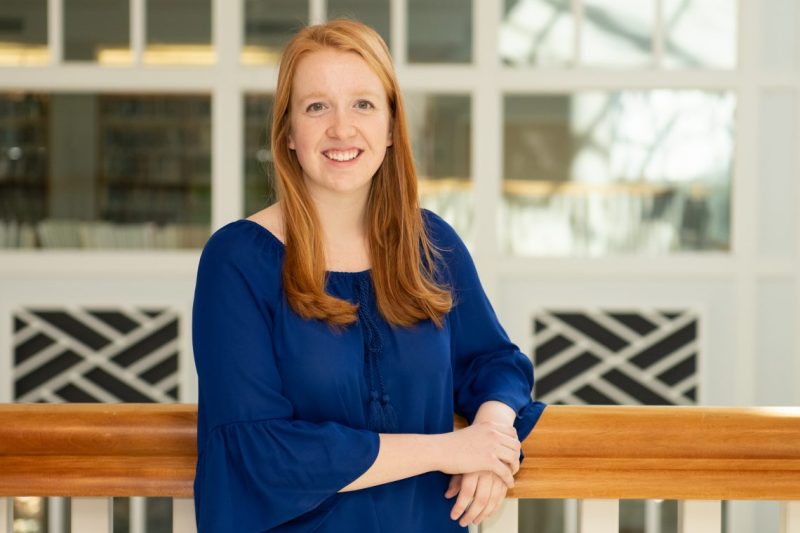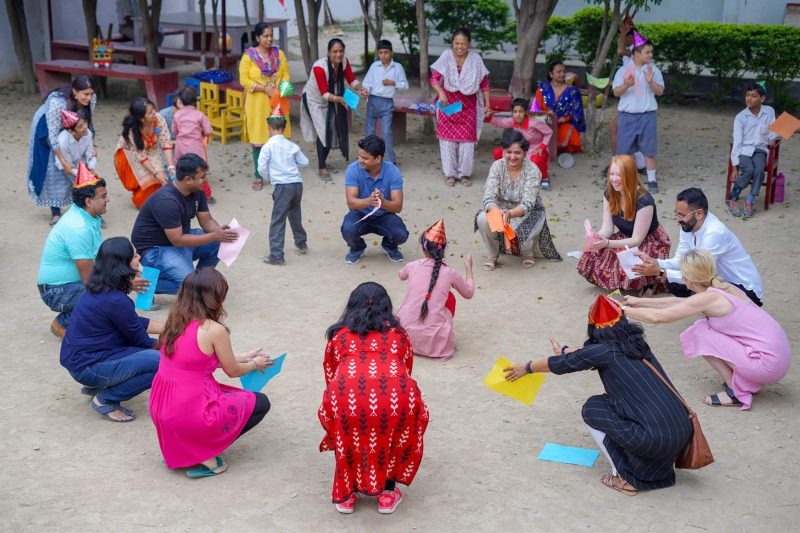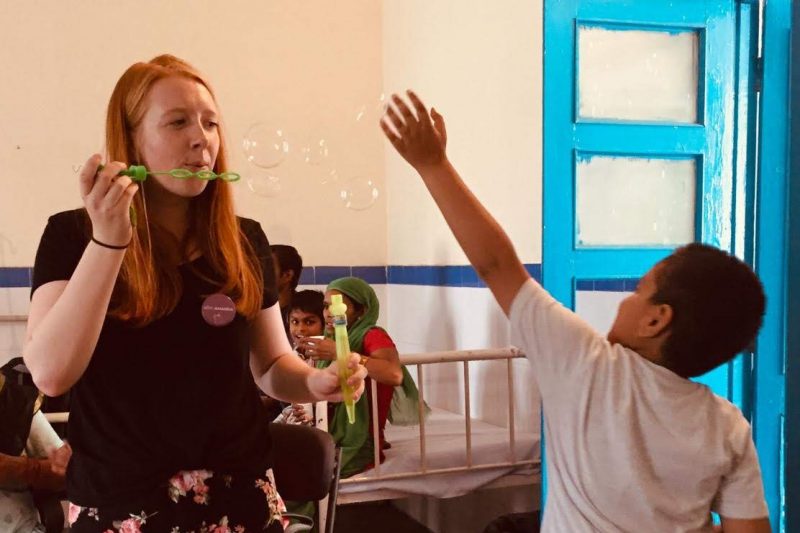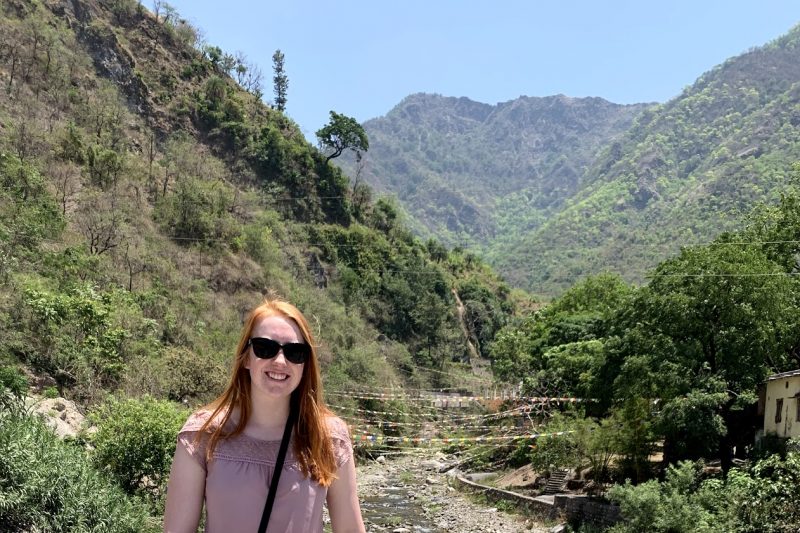The Human Side of Health Care A class in Denmark, an internship in India and lots of eye-opening experiences in the Lexington community have encouraged Amanda Dorsey '21 to advocate for inclusion in the public health field.
“My experiences at W&L have encouraged me to challenge my preconceived notions about what it means to be successful in health care.”
~ Amanda Dorsey ’21
Major: Cognitive and Behavioral Science
Minor: Poverty and Human Capability Studies
Hometown: Abingdon, Maryland
Q: What factors led you to choose W&L?
I always knew I wanted to attend a small university with small class sizes, inviting office hours and plentiful research opportunities. I also wanted a school where I could pursue health care while still dabbling in other academic interests. W&L exceeded this criteria but also stood out in how strongly it encourages students to step outside of Lexington into novel experiences. This was evident with the structure of Spring Term, Shepherd internship opportunities and the unbelievable alumni network.
Q: Why did you choose to major in cognitive and behavioral science?
I chose to major in cognitive and behavioral science (CBSC) because I was certain I wanted to go into health care but also wanted to branch outside of the traditional science courses. I started researching the department, then took a few classes for fun. Eventually, I realized how at home I felt in the CBSC department. The quality of the faculty is unmatched, as each mentor is cognizant of the students’ interests and goals, and they are always willing to help. Their curriculum also excels at developing research, data analysis and writing skills, which I expect to be very beneficial for my future.
Q: Tell us about some of your other favorite courses.
My favorite course was the Spring Term course Exploring Childhood in Denmark, which was taught by Associate Professor of Education Studies Haley Sigler and Professor of Economics Tim Diette. This class gave me the opportunity to travel abroad for my first time while also seeing such a different and interesting perspective on education. We went to a variety of different schools, including a Forest Kindergarten, and compared educational policy between Denmark and the U.S. The class ended with two peers and me teaching an economics lesson in a traditional classroom, and we ended up in a Danish newspaper for it!
I also thoroughly enjoyed Professor of Sociology Jonathan Eastwood’s class, Migration, Identity, and Conflict. During this class, I had my first exposure to R, a programming language we used to analyze real data sets. Our lines of code brought to life visual representations of the data examined based on theory discussed in classroom readings.
Q: You have also volunteered at the Blue Ridge Autism and Achievement Center (BRAAC). What do you do there?
In interned at BRAAC for three semesters, working alongside a teacher to deliver lessons and facilitate play for students at the center. I worked with one student for the entirety of each semester, giving me an opportunity to build a trusting relationship with him/her and fully understand each student’s individualized learning plan. These friendships, and the opportunity to see developmental disabilities from an educator’s perspective, are both informational and motivating in my endeavor to increase developmental disabilities’ inclusion in the public health spectrum.
Q: You spent the summer in India. What was that experience like?
I had a remarkable summer in Dehradun, India, interning at the Latika Roy Foundation, a NGO that provides resources for children with developmental disabilities and their families. The previous summer, I interned at the Carolina Institute for Developmental Disabilities, where I met a coworker from India who knew how special this organization is and how closely it aligned with my academic interests. She connected us, and eight months later, I was flying to the foothills of the Himalayas.
While I was there, I conducted a research project with my supervisor, analyzing intervention service access for young girls with disabilities. In addition, I helped established a leadership program in the inclusive after-school program, taught aerobics to staff and parents, designed a Sibling Support Workshop, and tutored English and math daily. My time in India expanded my interests in global health and showed me how important it is to increase the rate of conversation about developmental disabilities in this field.
One word to sum up much of what I saw and learned is the Hindi word jugaad, essentially meaning to find an innovative way to accomplish something that should be impossible. Even though the organization did not start with what one may define as an abundance of technology and resources, the Latika Roy Foundation has blossomed to foster a loving, inclusive community where children and families’ lives are monumentally changed for the better. I feel very grateful for the opportunity to have learned from this community this summer.
Q: You plan to return to India in 2020. What will you be doing?
I plan to study global and public health in Manipal, India, during fall 2020. I was looking for study abroad programs, including community-based learning, rigorous academics and an emphasis on research surrounding health care. This program in Manipal stood out the most to me, and to my excitement, happened to be back in India. I will be in a completely different area than I was before, so I am looking forwarding to a new perspective on the country that captivated me last summer.
Q: What is it like balancing academic commitments with your extracurricular involvements?
I love the jobs and roles that I fulfill on campus. I start or end each day with an extracurricular involvement, and it is genuinely something that I look forward to. Whether it is helping a peer with their resume at the Office of Career and Professional Development, teaching a group exercise class, or running a research participant, these are moments that relax and reboot my mind, even at times in which academic commitments are most demanding.
Q: How have your experiences enriched your time at W&L?
My experiences at W&L have encouraged me to challenge my preconceived notions about what it means to be successful in health care. Coming in, I only thought about the predefined paths, and I did not think deeply about interdisciplinary approaches or how passions could be combined. My experiences abroad, in the Shepherd Program, and in domestic internships have elucidated for me a more nuanced understanding of myself and how I want to contribute to health care, even if that exact role does not yet exis.
Q: Has anyone on campus served as a mentor to you?
Karla Murdock, David G. Elmes Professor of CBSC, and CBSC Professor and Department Head Wythe Whiting have been fantastic resources and mentors for me during my time here. I started working in their Cognition in Context lab as a first-year and have since taken several classes with them. Outside of all the academic support they have given me, they have mentored me in many professional decisions, and I am very grateful for their support!
More About Amanda
Q: What other extracurriculars are you involved in at W&L?
I am currently president of the Pre-Health Club and a peer career advisor in the Office of Career and Professional Development. I teach group exercise classes through Campus Rec and the local studio, fLex. I am also a Volunteer Venture leader and Rho Gamma.
Q: Favorite place to eat in Lexington? What do you order?
Pad See Ew at Napa Thai
Q: What one film/book do you recommend to everyone?
“The Glass Castle” by Jeannette Walls
Q: Favorite W&L memory so far?
My first time hiking Devil’s Marbleyard with friends
Q: Favorite W&L event?
My favorite W&L event is the FYOC campfire. I’ve worked with FYOC to organize this event the past two years, and I love watching a bunch of W&L students come together to learn how to swing dance!
 Amanda Dorsey ’21
Amanda Dorsey ’21 Dorsey participates in a birthday party celebration at a school in India before the school day begins.
Dorsey participates in a birthday party celebration at a school in India before the school day begins. Dorsey blows bubbles at one of the community-based follow-up programs in India. These programs are for families who live too far away to travel to the Latika Roy Foundation regularly.
Dorsey blows bubbles at one of the community-based follow-up programs in India. These programs are for families who live too far away to travel to the Latika Roy Foundation regularly. Dorsey explored Dehradun a free weekend. Here she poses for a pic in front of a beautiful view from the foothills of the Himalayas.
Dorsey explored Dehradun a free weekend. Here she poses for a pic in front of a beautiful view from the foothills of the Himalayas.
You must be logged in to post a comment.